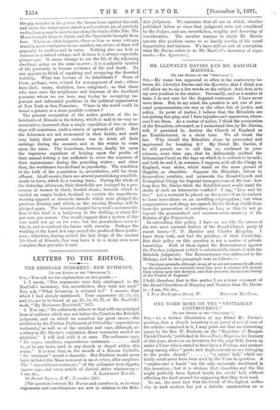MR. LLEWELYN DAVIES AND MR. M.A.LCOLM MAC COLL.
[TO THE EDITOR OF THE "SPECTATOR."]
SIR,—My name has appeared so often in the controversy be- tween Mr. Llewelyn Davies and the Spectator, that I think you will allow me to say a few words on the subject. And, first, as to my own position in the matter. Personally, and as a matter of taste, I do not care for the disputed vestments. I have never worn them. But, to my mind, the question is not one of per- sonal prepossessions, one way or the other, but of justice and policy. In point of justice, 1 believe that the Ritualists are not getting fair-play, and I hate injustice and oppression, where.. ever I see them. As a matter of policy, I think the persecution of the Ritualists, advocated, as I understand him, by Mr. Davies,. will, if persisted in, destroy the Church of England as an Establishment, in a short time. We all break the law. Why should the Ritualists alone be prosecuted and imprisoned for breaking it ? My friend Mr. Davies, if he will permit me to call him so, confessed in your columns, some time ago, that he deliberately omitted the Athanasian Creed on the days on which it is ordered to be said ;. and both he and L in common, I suppose, with all the Clergy in England, wear stoles, which stand on the same ground of illegality as chasubles. Suppose the Ritualists, driven to. desperation, retaliate, and prosecute the Broad-Church and. Evangelical Clergy for flagrant transgressions of the law ; how long does Mr. Davies think the Establishment would stand the- strain of such an internecine conflict ? I say, "Live and let live." Let a restraint be placed on the power of an incumbent to force innovations on an unwilling congregation ; but when congregations and clergy are agreed, let the Bishop shield them from the prosecution of outsiders, so long as they do not go beyond the grammatical and common-sense meaning of the Rubrics of the Prayer-book.
In advocating this policy, I have on my side the names of the two most eminent leaders of the Broad-Church party of recent times,—F. D. Maurice and Charles Kingsley. I knew them both, and had the privilege of their friendship. But their policy on this question is not a matter of private knowledge. Both of them signed the Remonstrance against the Purchas judgment (which is substantially identical with the Ridsdale judgment). The Remonstrance was addressed to the Bishops, and its last paragraph runs as follows :— "On these grounds, although many of us are not personally affected. by the judgment, we earnestly trust that your Lordships will abstain from acting upon this decision, and thus preserve the ancient liberty of the Church of England."
I hold, therefore, that in this matter I am a truer exponent of the Broad Churchism of Kingsley and Maurice than Mr. Davies is.—I am, Sir, &c.,






































 Previous page
Previous page